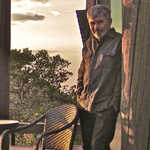Three years ago my husband (then boyfriend) and I were driving down a mountain in Ecuador. We were on a motorcycle and it was at the midway point of a five month journey from Cartagena, Colombia to Rio de Janeiro, Brazil. So far, sailing had been pretty smooth - it was before I would hitch hike through the Peruvian desert alone, before he would, with a high fever, navigate the mountain pass from Lima to Cuzco alone and before we would moronically risk our safety crossing a blocked border between Bolivia and Peru. The most trouble we’d had thus far was with police officers who wanted to extort bribes from us by lazily waving machine guns in our faces and from chillier mountain temperatures than we had anticipated.
Earlier that day we’d climbed to the top of a mountain blanketed in volcanic ash to peer at a neighboring volcano. The scenery had been eerie - muted, gray and we did not run into a single other person or animal the whole time we were up there. Amidst jokes that the world had ended while we were hiking we found our way to a secluded restaurant with a view of a town, in the darkness and distance, a small celestial cluster of orange light. The waiter was the first person we spoke to all day.
On the way down, in the near complete night, broken only by our headlights, we spotted a man. He was walking strangely, one foot dragging behind him and when we passed him he lurched at us, grabbing at the air between us and making a sound that was mostly a gurgle. We had been advised never to stop, especially on lonely mountain passes and especially not for anyone that looked like they needed help. This sounds insane, almost inhuman but we’d heard quite a few stories that began with a person who needed help and ended up with lost bikes or lives.
Afterward, we chastised ourselves, we should have stopped, but then we also shared the first totally irrational thought that we’d both had when we saw him. Regrettably, it wasn’t - that man needs help - it was: ZOMBIE.
For the rest of the trip, if we were particularly bored, we would pass time on the road by describing what our exit strategy would be in the event of a zombie invasion. We would look at the places we were in and talk about how well fortified they were, if one would try to hold their ground or leave. Somewhat not coincidentally our strategies always seemed to involve getting on a motorcycle and heading for the mountains.
Then, we came to Europe and I realized that most of medieval Europe was made to withstand a zombie invasion. Castles, churches, forts, all with moats and defenses, even old apartment buildings outfitted with shutters that cover every entrance way - they are all perfect anti-zombie hideaways. While I was amusing myself with this, imagining myself waiting out a zombie invasion in the heart of Barcelona peacefully it occurred to me that the fortifications that so impressed me had been built to withstand human invasion. It’s an obvious conclusion, but one that is of particular significance to a Canadian who grew up in an suburban habitat designed to facilitate traffic, not keep out invaders. Things in Canada were made with the assumption of law, order, peace and lack of large scale local conflict. But not so in Europe, which has had large cities for long enough to have built into them the history of its more war-like past.
Filed Under
Other moments in Barcelona
-
Photos I have missed; memories I have made
in Barcelona, Spain -
Barcelona is cloudy today; thank you Nature. Makes me miss the roulette of San Francisco weather...
in Barcelona, Spain -
Lounging around on a terrace on top of of the Eixample.
in Barcelona, Spain -
Immigration, Jetlag
Once I read that Spain is actually in the wrong time zone.
in Barcelona, España -
Talks, relationships, Complicated Situations
Neverending conversations or segmented reality?
in Barcelona, España -
Travel, nostalgia, missed opportunities
Unfulfilled plans
in Barcelona, Spain -
you & me, that's something. we are work in process. not defined; in discovery mood. happy anniversary to us #11
in Barcelona, España -
Barcelona, Color
Gaudi's Color Gamut
in Barcelona, Spain -
Cities, Culture, Travel
On cities that were made for friendship
in Barcelona, Spain










